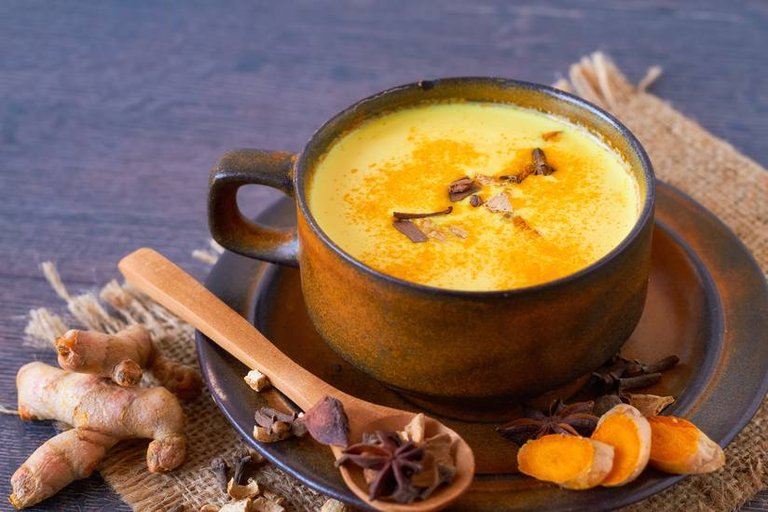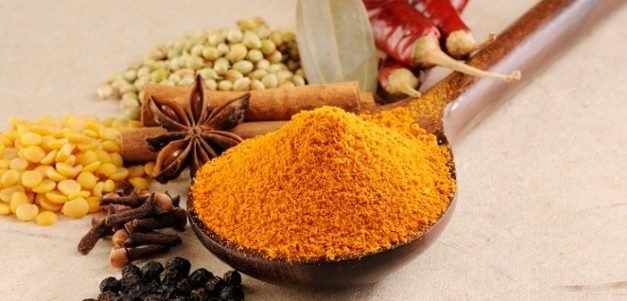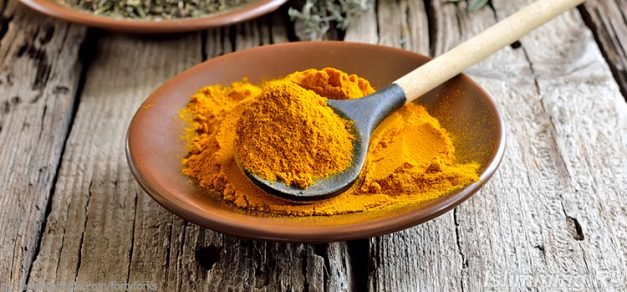( )
)
Curcuma, the main spice in the curry, is probably the most powerful herb on the planet in the fight and the potential reversal of a number of diseases.
The herb has so many healing properties that more than 10,301 related articles have been published, proving its numerous benefits, as well as the famous healing compound curcumin curcumin.
This puts turmeric on the list as one of the most commonly mentioned herbs with healing properties throughout science. The next most popular herbs are garlic, cinnamon, ginseng, ginger and milk thistle.
Of the 10,000 + studies of the main ingredient in turmeric curcumin, the most interesting thing is that when compared to conventional medicine, its benefits are equal to the benefits of a large number of pharmaceuticals.
Several studies have even shown that the use of turmeric tablets is more beneficial than the use of certain prescription medicines, taking into account possible side effects of their use and cost.
- Turmeric for weight loss
Using turmeric for weight loss can help prevent weight build-up and control blood sugar levels.
To be really effective, however, it should be used as part of a complete weight loss program that includes healthy eating and exercise.
Studies have shown that turmeric and its bioactive ingredient, curcumin, can help prevent the formation of mature fat cells and reduce the incidence of obesity and obesity.
Although studies show the benefit of turmeric at weight loss, most of the studies have been done on animals. Studies of the effects of curcumin on weight loss in humans continue.
There is growing interest in the use of nutritional supplements with turmeric weight loss diets because of a number of online reports showing that this natural extract can have serious positive effects.
Like many diseases, obesity is characterized by increased inflammatory processes in the body.
The active ingredient of turmeric, proven to modulate a wide variety of cellular functions to reduce harmful inflammatory processes.
A problem that occurs with the use of turmeric is that it contains on average between 2 and 7% of curcumin active substance. Food supplements with curcumin are available and contain significantly higher concentrations (more than 10 times those of the spice).
In a nutshell: Self-increasing turmeric intake is not an effective weight loss strategy but can greatly help to alleviate a number of conditions and symptoms associated with unwanted weight gains and obesity.
Curcuma as a spice has poor potency due to the low percentage of active substance (2-7%) versus many tablet forms (more than 10 times more curcumin).
2.. Turmeric contains bio active compounds with potent treatment properties
( )
)
Curcuma is the spice that gives the yellow color to curry.
It has been used in India for thousands of years, and as a medicinal herb, because of compounds called curcuminoids.
The most important and widely studied are curcumin.
It has powerful anti-inflammatory properties and is a very powerful antioxidant.
As mentioned, curcumin content in turmeric is not that high - about 2-7% of the weight.
Most of the studies that have proven the positive effects of the herb use turmeric extracts that contain predominantly curcumin. Doses in studies usually exceed 1 gram per day.
It would be very difficult to reach these levels only by using turmeric as a food spice.
Therefore, if you want to experience the full benefits of the herb, you need to target an extract containing significant amounts of curcumin.
Another weakness of turmeric is its weak absorption in the blood. Flavoring of pepper meals will raise the levels of piperine, a natural substance that has been shown to increase the absorption of curcumin.
Curcumin is also fat-soluble, so it may be a good idea to eat with a high-fat meal for even better absorption by the body.
Brief: Curcuma contains curcumin, a substance with powerful anti-inflammatory and antioxidant properties. Most studies use turmeric extracts that are standardized to include large amounts of curcumin to maximize the benefits of the curative herb.
3.Curcumin is a natural anti-inflammatory compound

The strong anti-inflammatory properties of the body are of paramount importance to our health.
They help fight other organisms and have a role in repairing the damage from them.
Without anti-inflammatory properties, pathogens like bacteria can easily harm the body.
Chronic inflammation is thought to play a major role in almost all Western diseases. This includes heart disease, cancer, metabolic syndrome, Alzheimer's disease and various degenerative conditions.
Therefore, anything that can help to fight chronic inflammation is of potential importance for the prevention and even treatment of these diseases.
It turns out that curcumin is a highly anti-inflammatory agent. It is so powerful that it meets the effectiveness of some anti-inflammatory drugs.
In several studies, its efficacy was compared with anti-inflammatory pharmaceuticals but with no side effects.
In brief: Chronic inflammation is known to contribute to very common illnesses. Curcumin can inhibit many molecules that are known to play an important role in inflammation.
- Curcuma dramatically increases the antioxidant capacity of the body
.jpg)
Oxidative damage is considered to be one of the mechanisms behind aging, but it is also associated with a number of other diseases.
Free radicals interact with important organic substances such as fatty acids, proteins or DNA.
The main reason antioxidants are so useful is that they protect our body from free radicals.
Curcumin is a powerful antioxidant that can neutralize harmful free radicals due to its chemical structure.
At the same time, the active substance in turmeric boosts the body's own antioxidant enzymes.
Thus, curcumin acts against free radicals in 2 different ways: Blocks them directly and stimulates the body's antioxidant mechanisms.
In brief: Curcumin has powerful antioxidant properties. Neutralizes free radicals, and then stimulates the body's own antioxidant enzymes.
Curcumin improves brain function and reduces the risk of brain diseases
Neurons are capable of forming new connections, but in certain areas of the brain they can also multiply and increase.
One of the main drivers of this process is the neurotrophic factor (BDNF), a type of growth hormone functioning in the brain.
Very common brain disorders are associated with decreased levels of this hormone. Some include chronic depression and Alzheimer's disease.
Interestingly, curcumin may increase the brain levels of BDNF.
Thus, herb extract may be effective in delaying or even reversing many brain diseases and those associated with reduced brain function due to aging.
Briefly: Curcumin raises levels of BDNF, which stimulates the growth of new neurons and fights various degenerative processes in the brain.
- Curcumin effectively reduces the risk of heart disease
.jpg)
Heart diseases are incredibly complex and there are a number of factors contributing to them.
Curcumin can help to reverse many steps in the heart disease process.
The main benefit of curcumin when it comes to heart health is improving the function of the endothelium - the lining of the blood vessels.
Endothelial dysfunction is a major driver of heart disease and includes an inability to regulate blood pressure, blood clotting and other similar factors.
One study shows that curcumin may be as effective as physical exercise, and that it works in a similar way as the Atorvastatin medicine.
As mentioned above, the curative herb has the ability to reduce inflammation and oxidation in the body, important factors in heart disease.
Briefly: Curcumin has a beneficial effect on several factors known to play a role in the development of heart disease. It improves the function of the endothelium (the lining of the blood vessels) and is a powerful anti-inflammatory agent and antioxidant.
7.7. Turmeric can help prevent (even cure) cancer

ancer is a disease characterized by uncontrollable cell growth.
There are many different forms of cancer, but they also have common properties, some of which appear to be affected by curcumin supplementation.
Researchers study curcumin as a useful herb in the treatment of cancer. It can affect the growth, development and spread of cancer at the molecular level.
Studies have shown that the active substance in turmeric can reduce angiogenesis (growth of new blood vessels in tumors), metastasis (cancer spread), and contribute to the death of cancer cells.
Perhaps curcumin will be used along with conventional cancer treatment one day. It is too early to say for sure, but it looks promising and has been intensively studied in recent years.
Briefly: Curcumin leads to a number of changes at the molecular level that can help prevent and even cure cancer.
- Curcumin may be useful in the prevention and treatment of Alzheimer's disease
Alzheimer's disease is the most common neurodegenerative disease in the world.
Unfortunately, there is still no proven successful treatment for the disease.
Hence, its prevention is paramount.
It is known that inflammation and oxidative damage play a major role in Alzheimer's disease. As mentioned, curcumin has a beneficial effect on both.
One of the key features of Alzheimer's disease is the accumulation of protein assemblies, called amyloid plaques. Studies have shown that curcumin can help clear these plaques (study).
Whether curcumin can really delay or even reverse the progression of Alzheimer's disease should be further investigated.
In short: Turmeric may have serious benefits in the prevention of Alzheimer's disease and other diseases.
That's the first part of the article.I hope that we will be healthier with the info about Turmeric.